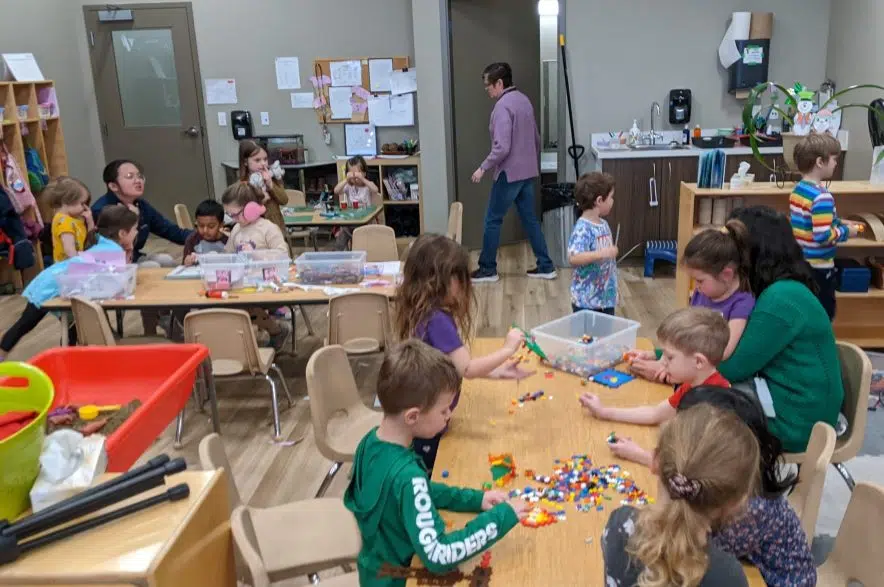The announcement of $10-a-day child care coming to Saskatchewan three years earlier than anticipated is good news for Regina’s Julie Wermie.
Wermie is a mother of four and has relied on the child-care system, first with her two oldest kids and now with two younger ones.
She says the change in fees as of April 1 will help her family a lot.
“When my kids started daycare, (fees) were $800 to ($)900 per month,” Wermie said. “The two little ones going down to $10 a day has impacted our family hugely, especially with the cost of living going up so much. We’re (now) able to put away money for their education fund.
“It’s going to help in the long run.”
According to the government, fees will drop to $217.50 per month for a child under the age of six who goes to a regulated child-care facility on a full-time basis.
Wermie said Monday’s announcement will also help when it comes to fighting inflation.
She suggested that because of the extra savings, her family can now afford to now take vacations in the summer, something which might not have been possible if the change didn’t happen.
“We’ll be able to take our whole family of six on vacations without having to save for two or three years in advance,” she explained. “We can do more things as a family and it (won’t) be such a burden on us.
“I’m happy the government has been able to accommodate the rising fees of inflation and allow us to have a little bit of a break with the fees.”
She calls it a relief.
“Having four children — and two children currently attending the YMCA (for child care) — the $10 a day is going to impact our family. We’re really looking forward to the decrease in fees,” she added.
Usually when it comes to working together, the Saskatchewan Party and federal Liberals don’t see eye to eye, but both agreed this was something they wanted to get done.
“I know officials worked very closely,” said Saskatchewan Minister of Education Dustin Duncan. “I think that when we first looked at signing the agreement, we were probably lower than other provinces in terms of what our child-care fees were. Getting to $10 a day was probably going to be the easier part over the next five years.”
Going forward, both levels of government will look to build 28,000 more additional spaces in the province by 2026. That was also part of the agreement signed in August.
With additional money coming from the federal government, Duncan said that money will be used for not just creating more spaces, but getting staffing levels in place for the extra demand that will come.
“Now with the five-year agreement, that’s $1.1 billion coming from the federal government. What we’re doing now is increasing training spaces within our post-secondary institutes to be able to have a trained workforce,” added Duncan.
“We’re (also) looking to establish a wage grid so that we can ensure these are careers of choice for people in the province so we can be competitive when it comes to the marketplace.”

Federal Minister of Families, Children and Social Development Karina Gould. (Shane Clausing/980 CJME)
Canada’s Minister of Families, Children and Social Development Karina Gould feels the province is on the right track when it comes to making child care accessible for everyone.
“One of the areas where Saskatchewan has been a leader is on inclusion,” she said. “Not only the expansion into rural and remote communities but also with children with exceptionalism and special needs has really been an important focus here.
“In fact, I think they’ve been leading the country in making those inclusive spaces available. I think that’s something you can be quite proud of in Saskatchewan.”
Manitoba is to implement the $10-a-day target on April 2.











